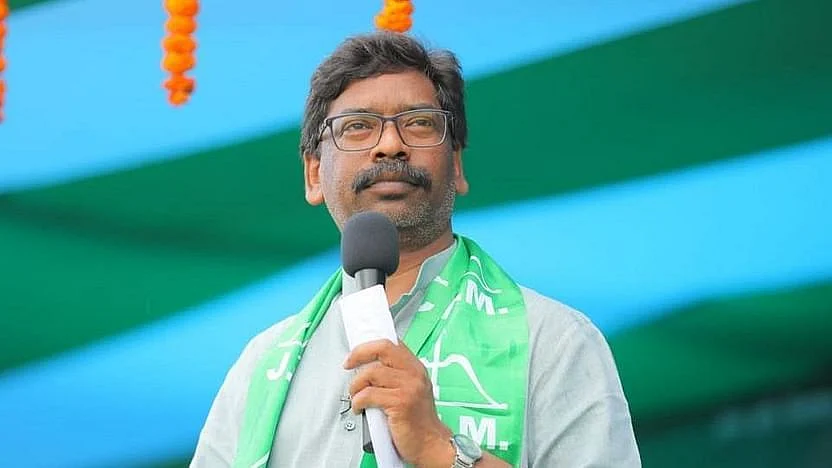
Hemant Soren's Resignation, Choice of New CM: 4 Aspects to JMM's Fightback
JMM supporters feel Hemant Soren is being targeted for being an assertive Adivasi leader.

advertisement
For Jharkhand Mukti Morcha supporters, there was an element of inevitability in seeing Hemant Soren resign as the chief minister of Jharkhand on 31 January.
"We knew the Centre won't allow him (Soren) to complete a full term," many supporters say.
Soren was about to be only the second chief minister in Jharkhand's 24 year history to complete a full term, the first being BJP's Raghubar Das (2014 to 2019). Had he stayed the CM till the elections due later this year, Soren would have been the first Adivasi CM to complete a full term. This, in a state where five out of six CMs have been Adivasis.
JMM supporters believe that Soren is paying the price for being an "unapologetic Adivasi leader" and "not compromising with the BJP".
The Importance of Hemant Soren
Soren's win in the 2019 Assembly elections was the biggest win for any alliance in Jharkhand, a state that which has faced unstable coalitions since its inception in 2000.
The victory, to a great extent, belonged to Soren and his support among Adivasi voters and a strong pro-poor plank that he put forward.
The last four years of reasonably stable governance in Jharkhand has furthered improved Soren's stature and helped him emerge out of his father Shibu Soren's shadow.
Clear Ideological Stand Against BJP
The JMM has in the past formed post-poll alliances with the BJP. However, Hemant Soren over the past one decade seems to have taken a clear position to not ally with the party.
This stems from his understanding that since the JMM's primary rivalry is with the BJP, any adjustment with the party would only end up weakening the JMM.
The tussle between the two parties is also about who deserves credit for the formation of Jharkhand in the first place - JMM who spearheaded the agitation for a separate state or BJP under whose rule the state was carved out of Bihar.
It has been a long-pending demand of several Adivasi groups that Sarnaism be recognised as a separate religious category.
This made Soren a threat not just a political threat to the BJP but an ideological threat to the Sangh Parivar, which has been trying since several decades to 'Hinduise' tribals.
Soren also combined the discourse of tribal rights with a championing of the rights of locals over jobs and resources, which was at the core of the Jharkhand movement.
Did Soren Make a Mistake By Resigning?
Observers argue that since the 2019 mandate undoubtedly belong to Soren and he was the face of the government, he should have dug in his heels instead of resigning.
In November 2023, at the thick of speculation that Delhi CM Arvind Kejriwal could be arrested, the Aam Aadmi Party announced that the Delhi government will run from jail if required.
JMM insiders say the choice was between approaching the matter politically or legally. There is a perception that had Soren chosen to make such an announcement, it would have given the Governor a pretext to dismiss the government.
Being in power for the next few months is essential for the JMM, not so much from the point of view of the Lok Sabha elections but the Assembly elections due in the end of 2024. The government would ideally like to take a number of key policy decisions and announce major sops.
The Choice of Champai Soren
"It was the anti-Adivasi mindset of the media that the spread the rumour of Hemant Soren making his wife as the CM. They wanted to present JMM as a party that belongs to one family and not a party that represents Adivasis and the indigenous people of Jharkhand," a JMM insider told The Quint.
Champai Soren is known as the 'Kolhan Tiger' for his courage during the statehood movement. He is a six-time MLA from Seraikella, in Adivasi heartland Singhbhum district.
Soren could easily have chosen a family member or a political lightweight but he chose a veteran instead. The first challenge for Champai Soren would be to secure the invite to form the government from the Governor. He would have to hit the ground running, with the Lok Sabha elections around the corner.
- Access to all paywalled content on site
- Ad-free experience across The Quint
- Early previews of our Special Projects
Published: undefined